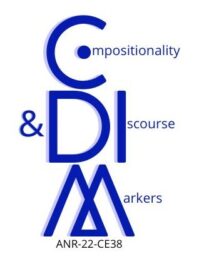Discourse Markers: Markers in Discourse , Markers on Discourse
International Conference, 21st-22nd June 2024, Metz, France
Call for papers (deadline February 1st 2024)
Website : https://discoursemarkers.sciencesconf.orgDiscourse markers have been examined in various models of grammar, such as Functional Discourse Grammar or Construction Grammar, considering their status as markers in discourse. From a macro-syntactic point of view, they are seen as peripheral, independent and movable entities enabling a bracketing function. In interaction-based models of grammar, such as Interactional Linguistics, the focus of analysis has been on their status as markers on discourse. As such, these approaches examine interpersonal and interactional functions, for instance, turn-taking, positioning of interlocutors vis à vis each other, vis à vis their discursive contribution and their attitude towards their own contribution.
The goal of this conference is to bring together research from different theoretical frameworks in order to find possible bridging points between grammar-based approaches of “markers in discourse”, function-based approaches of “markers in /on discourse” and discourse-based studies. We welcome studies which address at least one of the following issues:
1) Revisiting “in discourse” on a wider scale:
Studies would go beyond single discourse markers and examine for instance
· Clusters of discourse markers in their linearity
· Patterned co-occurrences of discourse markers and their syntactic slots (or macro-positions)
· Multiword units as discourse markers
· Discourse markers across discourse units (prospective and retrospective pointing function)
2) Revisiting “in / on discourse” on a wider scale:
Studies would need to make a link between position and function of discourse markers in and on language, considering for instance
· Discourse markers, sequentiality and cohesive function
· Discourse markers and discourse coherence
· Stretch of discourse and span of meaning negotiation
· Discourse markers, subjectification and intersubjectification
· Discourse markers and dynamics of interpersonal attitude
3) Revisiting markers “on discourse” on a wider scale:
Studies would need to be interaction-based and tackle the distribution of discourse markers in and across discourse genres and/or the ways in which discourse markers intertwine with context
· Discourse markers, and linguistic accommodation
· Discourse markers, contextualisation cues and indexicality
· Discourse markers, linguistic variation and language varietiesSubmission are closed
Conference Languages: English and FrenchInvited Speakers
Maj-Britt Mosegaard Hansen, Professor of Linguistics and Pragmatics, University of Manchester, Great Britain
Graham Ranger, Professor, Université d’Avignon et des Pays du Vaucluse, FranceDates and venue: Metz, Île du Saulcy, France ; Friday 21 June / Saturday 22 June 2024
Friday: building B, rooms B110 and B110 ; Saturday: building A, rooms A208 and A209Organising committee: Florine Berthe (ALTER, Université de Pau et des Pays de l’Adour), Mathilde Dargnat (ATILF, Université de Lorraine), Anita Fetzer (University of Augsburg), Isabelle Gaudy-Campbell (IDEA, Université de Lorraine)
Scientific committee: Karin Aijmer, Florine Berthe, Bernard Combettes, Mathilde Dargnat, Stefan Diemer, Anita Fetzer, Isabelle Gaudy-Campbell, Günther Kaltenböck, Matthias Klumm, Laure Lansari, Ursula Lenker, Diana Lewis, Francois Nemo
Some references:
Aijmer, Karin. English Discourse Particles: Evidence from a Corpus. John Benjamins, 2002.
Auer, Peter and Aldo Di Luzi (eds.). The Contextualization of Language. John Benjamins, 1992.
Cuenca, Maria Josep and Ludivine Crible. “Co-occurrence of discourse markers in English: From juxtaposition to composition”. Journal of Pragmatics 140, 2019, p. 171-184.
Crible, Ludivine. Discourse Markers and (Dis)fluency. Forms and functions across languages and registers. John Benjamins, 2018.
Degand, Liesbeth et al. Discourse Markers and Modal Particles: Categorization and Description. John Benjamins, 2013.
Dostie, Gaétane. Pragmaticalisation et marqueurs discursifs. Analyse sémantique et traitement lexicographique. De Boeck/Duculot, 2004.
Fischer, Kerstin, (eds). Approaches to Discourse Particles. Brill, 2006.
Hansen, Maj-Britt M. Particles at the Semantics/Pragmatics Interface: Synchronic and Diachronic Issues, a Study with Special Reference to the French Phrasal Adverbs. Elesevier, 2008.
Heine Bernd et al. The Rise of Discourse Markers. Oxford University Press, 2021.
Jucker, Andreas H. and Yael Ziv. Discourse Markers: Descriptions and Theory. John Benjamins, 1998.
Kaltenböck, Gunther et al. Outside the Clause: Form and function of extra-clausal constituents. John Benjamins, 2016.
Lansari, Laure. A Contrastive View of Discourse Markers: Discourse Markers of Saying in English and French. Palgrave Macmillan, 2020.
Pichler, Heike. The Structure of Discourse-Pragmatic Variation. John Benjamins, 2013.
Schiffrin, Deborah. Discourse Markers. Cambridge University Press, 1987.
